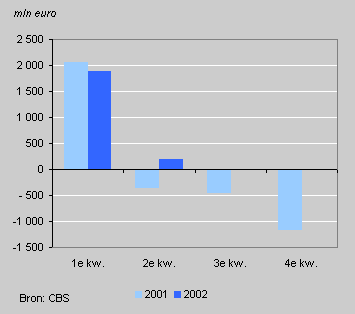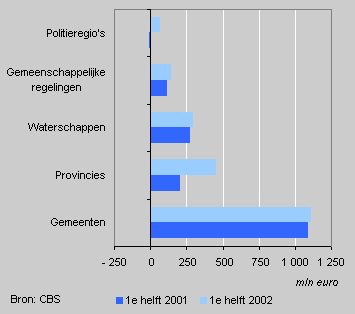Higher surplus for local government

In the first half of 2002 the surplus on the balances of local authorities was 0.4 billion euro higher than in the previous year, putting the contribution of local authorities to the EMU balance at 2.1 billion euro in the first half of the year.
Second quarter in particular contributes to increase in surplus
In the first quarter of 2002 the surplus of local authorities was slightly smaller than in 2001. However, the second quarter more than compensated for this, with a surplus of 183 million euro, compared with a deficit of 371 million euro in the second quarter of 2001.
EMU balance for local authorities

Large surplus in first quarter
Just as in the first quarter of 2001, the EMU balance of all local authorities was strongly in the black in the first half of 2002. This was connected with the administrative procedures at local government; revenues from tax and central government are booked at the moment they become receivable. This is compensated in the other quarters. In 2001 this ultimately resulted in a positive balance of 40 million euro for the whole of 2001.
Large rise in surplus for provinces
The surplus was larger for all local authorities in the first half of 2002 than in 2001. The largest increase was for provincial government: they had a positive balance of 0.5 billion euro. The largest surplus was for municipalities, though: 1.1 billion euro.
EMU balance of local authorities by level of government

Long-term debts falling
In the first half of 2002 debts fell by 0.4 billion euro to 48.3 billion euro. The decrease was caused by a reduction in long-term debts. Short-term debts even rose slightly.
Short-term claims increase
Receivables rose by 1.6 billion euro in the first half of 2002 to 44.8 billion euro. This was caused by a substantial increase in short-term claims, especially for municipalities. Long-term loans fell slightly. The fall in both long-term claims and long-terms debts continues the trend of recent years.
Marty Rottman